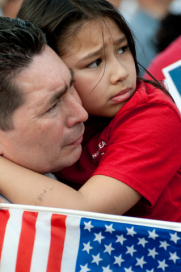
Back to the law. Although the Supreme Court ruled against the Obama Administration in the case Texas v. United States, 15-674, one of the immigration “reforms” that the Obama Administration proposed back in November, 2014, which happily was not part of the lawsuit, was recently implemented. Specifically, expanding the use of “provisional unlawful presence waivers” beyond spouses and minor children of U.S. citizens to also include the spouses and minor children of lawful permanent residents (commonly known as LPR’s or Green Card holders) as well as the adult children of U.S. citizens, and clarifying the “extreme hardship” standard that must be met to obtain this waiver.
In general, aliens who are lawfully present in the United States who have spouses or parents that are U.S. citizens or Green Card holders may be eligible to apply for an immigrant visa with a U.S. embassy or consulate outside the United States, or apply for “adjustment of status” with U.S. Citizenship and Immigration Services (“USCIS”) in the United States. In order to obtain an immigrant visa, the alien is required to depart the United States so that he or she can apply for his or her visa at a U.S. embassy or consulate outside the United States.
However, those aliens who have been unlawfully present in the United States prior to their departure generally trigger a three (3) or ten (10) year bar from returning to the United States if the alien has been unlawfully present in the United States for more than 180 days (the three year bar) or one (1) year or more (the ten year bar).
Under current law, these bars from returning to the United States can be “waived” if the denial of the alien’s admission to the United States would result in “extreme hardship” to the alien’s U.S. citizen spouse or parents. However, the time involved in an alien obtaining a waiver, and the attendant risk associated with the alien having to leave the United States not knowing whether he or she will actually receive the waiver and be able to return to the United States, has kept many unlawfully present aliens who could legalize their status in the United States from doing so.
To deal with this issue, in 2013, the Obama Administration began allowing spouses or children of U.S. citizens who are unlawfully present in the United States to request and obtain “provisional waivers” of the three and ten year bars to their admission while they are in the United States. (Once approved, they still need to leave the United States to apply for an obtain their immigrant visa.) This relief, however, was not available to the spouses and children of LPR’s. Until now.
On July 29, 2016, the Department of Homeland Security (“DHS”) published a final rule expanding eligibility for provisional unlawful presence waivers to all individuals who are statutorily eligible for an unlawful presence waiver and who can establish extreme hardship to a U.S. citizen or LPR spouse or parent.
The provisional waiver process is meant to promote family unity by reducing the time that eligible individuals are separated from their family members while they complete immigration processing abroad. The provisional waiver process is a welcome contrast to the normal waiver application process, which requires aliens to first depart the United States and then apply for a waiver. Under the normal process, the alien may be outside the United States for many months, waiting for a decision on their waiver application. This separation, and the uncertainty of whether the waiver will actually be approved, has caused many individuals to simply forgo the opportunity legalize their status. The provisional waiver process eliminates most (but sometimes not all) of the uncertainty by allowing for pre-approval of the waiver prior to the alien’s departure from the United States.
I always counsel my clients that it’s much easier to fight their battles with DHS when they’re physically in the United States. These new regulations now allow them to do so. This is a very welcome change.
